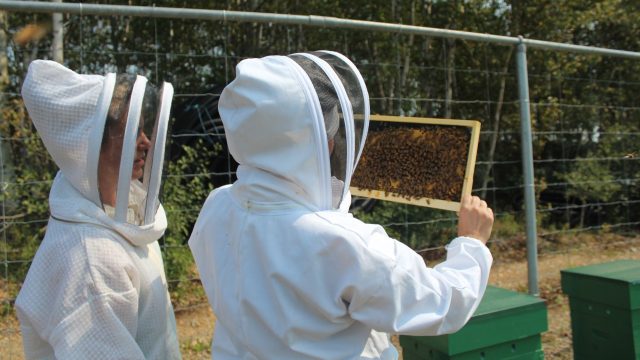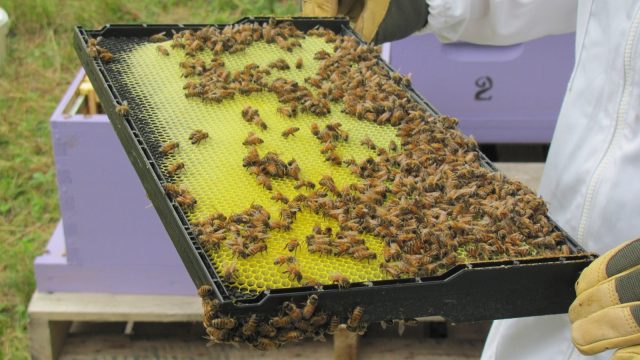Apiculture in Newfoundland and Labrador
 Commercial apiculture in Newfoundland and Labrador has seen steady growth in recent years. Beekeepers in the province offer a variety of products and services to the public and producers, including nucleus colonies, queens, honey and beeswax products, pollination services, and secondary products. Demand for these local products and services continues to increase each year, creating ample opportunity for growth in this unique sector through expansion of existing and development of new apiaries in the province.
Commercial apiculture in Newfoundland and Labrador has seen steady growth in recent years. Beekeepers in the province offer a variety of products and services to the public and producers, including nucleus colonies, queens, honey and beeswax products, pollination services, and secondary products. Demand for these local products and services continues to increase each year, creating ample opportunity for growth in this unique sector through expansion of existing and development of new apiaries in the province.
Honey bees produce products with properties that are beneficial for human health. While honey is the most common product harvested from the hive and marketed by beekeepers, honey bees also produce wax, pollen, propolis and royal jelly. The production value of honey alone was $277,219 million in Canada in 2023[1] and $3.39 million in the Atlantic Provinces in 2022[2]. Honey bees on the island of Newfoundland are free from Varroa Mite (Varroa destructor), Small Hive Beetle (Aethina tumida), Greater Wax Moth (Galleria mellonella) and Honey Bee Tracheal Mite (Acarapis woodi). These significant bee pests have been found extensively throughout North America and in almost all other jurisdictions worldwide, and pose a significant challenge to bee management throughout their range.
 The Varroa mite decimates hives and is a vector for virus transmission. This mite in particular is documented to be the most serious threat to honey bee health, and the most difficult honey bee pest to control. Our provincial beekeepers are not challenged with Varroa management, and experience a beekeeping situation that is unparalleled globally, resulting in healthy, strong colonies. The absence of Varroa in Newfoundland and Labrador also aids in the documented lower overwintering losses the province experiences compared to the rest of Canada.
The Varroa mite decimates hives and is a vector for virus transmission. This mite in particular is documented to be the most serious threat to honey bee health, and the most difficult honey bee pest to control. Our provincial beekeepers are not challenged with Varroa management, and experience a beekeeping situation that is unparalleled globally, resulting in healthy, strong colonies. The absence of Varroa in Newfoundland and Labrador also aids in the documented lower overwintering losses the province experiences compared to the rest of Canada.
Importing honey bees from outside of Newfoundland and Labrador without a permit from the Department of Fisheries, Forestry and Agriculture is prohibited under the Animal Health and Protection Act. The Provincial Government would only consider importation of honey bees from regions that are free from: Varroa Mite, Small Hive Beetle, Honey Bee Tracheal Mite, and Greater Wax Moth. Currently, Western Australia is the only region that can meet these requirements.
A permit to import is only granted under rare or exceptional circumstances, and follows strict inspection and quarantine protocols in accordance with both federal and provincial regulations. Contravention of these regulations may result in return of bees to the point of origin at the owner’s expense, or destruction on site with no compensation provided.
[1] Stats Canada 2023. Table 32-10-0353-01 Production and value of honey
[2] Stats Canada 2022. Statistical Overview of the Canadian Honey and Bee Industry, 2019
2022-23 Winter Loss Survey
The Canadian Association of Professional Apiculturists (CAPA) works with all provincial apiarists to collect information and compile a national report on annual honeybee wintering losses. Newfoundland and Labrador beekeepers (commercial and hobbyist) are requested to complete the annual Overwintering Colony Loss Survey consisting of 10 questions based on the national beekeeping industry. Please submit responses via email to provincialapiarist@gov.nl.ca by May 26, 2024.
Links
- Animal Health Regulations
- Canadian Association of Professional Apiculturists (CAPA)
- Canadian Honey Council (CHC)
- Canadian Pollination Initiative (CANPOLIN)
- Prevention of Honey bee Colony Losses (COLOSS)
